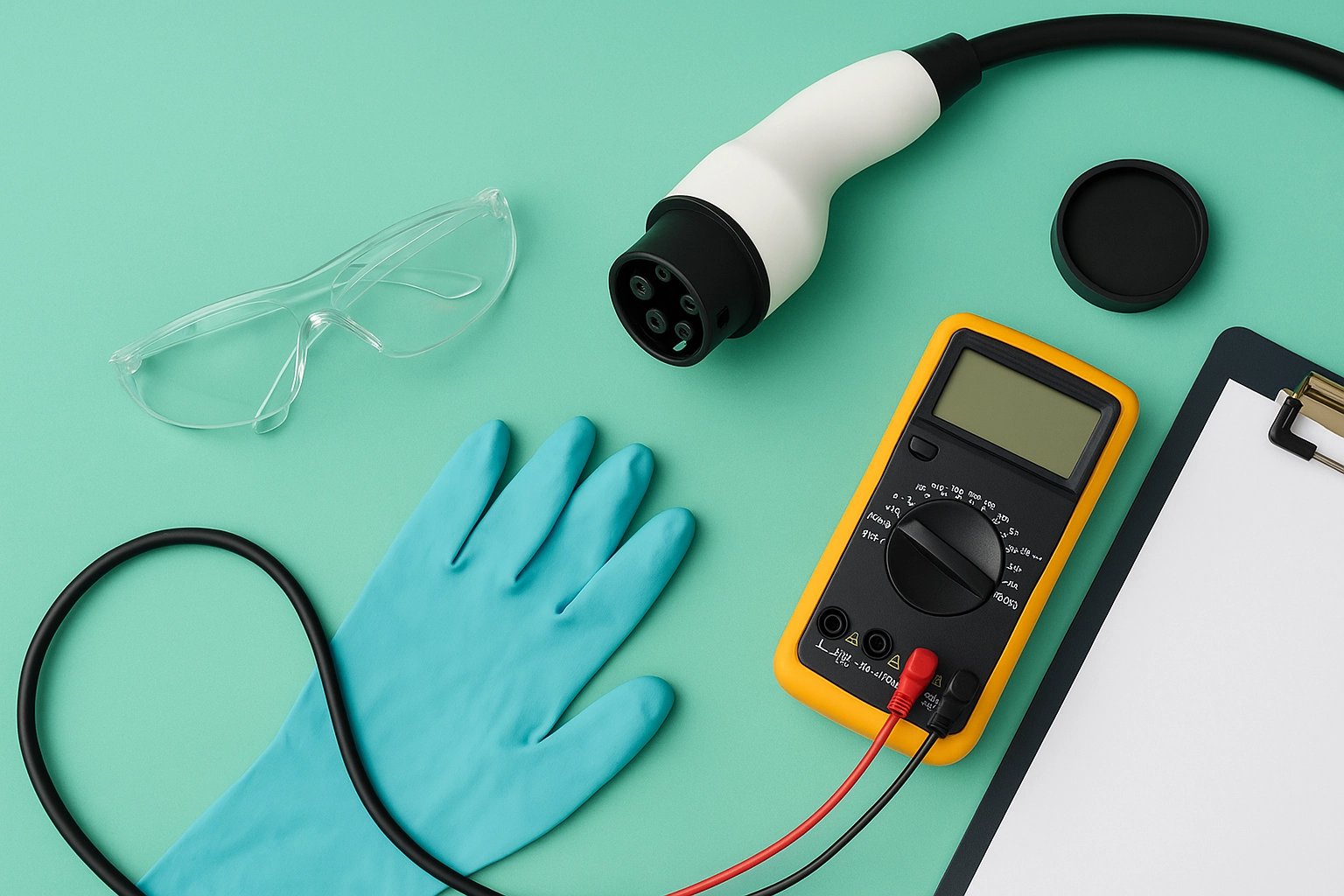IEC 63000 Environmental Compliance of Charging Equipment Testing
The IEC 63000 series is a set of international standards developed by the International Electrotechnical Commission (IEC) for ensuring environmental compliance in the design, manufacture, and operation of electric vehicle (EV) charging equipment. This service focuses on testing according to these standards to ensure that EV charging equipment meets stringent environmental requirements.
Environmental compliance is critical for EV charging equipment as it ensures that products are not only safe but also sustainable from an ecological perspective. The IEC 63000 series addresses various environmental factors such as temperature, humidity, altitude, salt fog, sand and dust, vibration, and electromagnetic compatibility (EMC) to name a few.
The testing process involves assessing the charging equipment under controlled conditions that simulate real-world environments where it will be deployed. This ensures that the equipment is robust enough to withstand the stresses of different climates and operational conditions without compromising safety or performance.
One of the key aspects of this service is the use of high-precision instruments designed specifically for environmental testing. These include climate chambers, altitude simulators, salt spray chambers, vibration testers, and EMC test systems. The equipment used must be capable of replicating a wide range of environmental stressors that EV charging stations could encounter.
The testing process typically begins with specimen preparation, which involves ensuring that the charging equipment is in its final operational configuration before being subjected to various tests. This includes checking all connections, verifying power supplies, and calibrating instruments.
After preparation, the equipment undergoes a series of tests to evaluate its performance under different environmental conditions. For instance, temperature cycling tests assess how well the equipment can handle extreme temperature changes from hot to cold. Humidity testing evaluates the equipment's resistance to moisture, which is crucial for preventing corrosion and ensuring long-term reliability.
Altitude testing simulates high-altitude environments where charging equipment might be deployed, while salt fog testing ensures that the equipment can withstand corrosive environments often found near coastal areas or in industrial settings. Vibration tests assess the robustness of the equipment against physical shocks and vibrations during transportation or operation.
EMC testing is also a critical component of this service as it ensures that EV charging equipment does not interfere with other electronic devices and can function reliably in the presence of electromagnetic interference (EMI). Proper EMC compliance is essential for maintaining safety, performance, and interoperability within an increasingly interconnected world.
The results of these tests are meticulously recorded and analyzed to ensure they meet specified acceptance criteria outlined in IEC 63000. Compliance with these standards guarantees that the EV charging equipment operates safely and reliably under all expected environmental conditions, contributing to overall sustainability goals.
Applied Standards
| Standard | Description |
|---|---|
| IEC 63000-1 | General requirements for environmental testing of electrical and electronic equipment. |
| IEC 63000-2 | Requirements specific to EV charging equipment. |
| IEC 63000-3 | Guidance on how to conduct environmental testing experiments. |
| Test Conditions | Description |
|---|---|
| Temperature Range | -40°C to +85°C (for example). |
| Humidity Levels | 10% RH to 98% RH. |
| Vibration Intensity | 3 g peak-to-peak in three axes. |
Eurolab Advantages
At Eurolab, we offer unparalleled expertise and state-of-the-art facilities dedicated to IEC 63000 environmental compliance testing for EV charging equipment. Our experienced team of engineers and technicians is highly skilled in conducting these complex tests with precision and accuracy.
We utilize cutting-edge laboratory instrumentation that allows us to simulate a wide range of environmental conditions, ensuring that our clients receive accurate and reliable test results. Our commitment to quality ensures that every piece of equipment tested meets the highest standards set by IEC 63000.
Our facilities are equipped with climate chambers capable of maintaining precise temperature and humidity levels, altitude simulators for high-altitude testing, salt fog chambers for corrosion resistance evaluation, vibration testers for mechanical durability assessment, and comprehensive EMC test systems to ensure electromagnetic compatibility. These advanced tools enable us to provide the most comprehensive environmental compliance testing available.
Moreover, Eurolab's rigorous quality control measures ensure that all tests are conducted under strict protocols, leading to consistent and repeatable results. Our laboratory is certified to international standards, providing assurance of impartiality, independence, and competence in our testing services.
In addition, we offer a range of additional support services such as technical consulting, training programs, and certification assistance tailored specifically for the automotive sector. These supplementary offerings help our clients navigate the complexities of regulatory compliance effectively.
Quality and Reliability Assurance
- Comprehensive environmental simulation to replicate real-world conditions.
- Use of high-precision instruments for accurate measurement and analysis.
- Strict adherence to IEC 63000 standards during all testing processes.
- Ongoing calibration and validation of test equipment to maintain accuracy.
- Comprehensive record keeping and detailed reporting of test results.
- Independent third-party verification of test procedures and outcomes.





